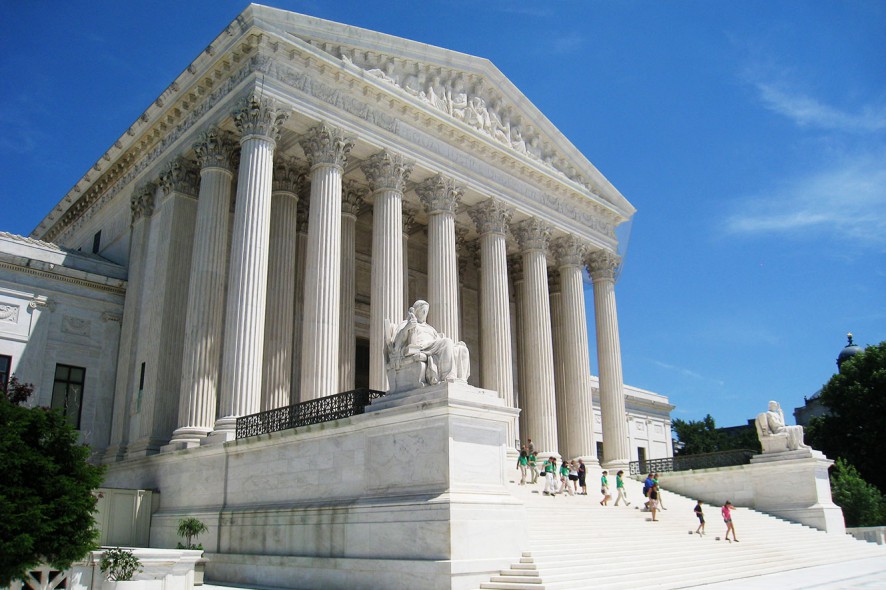Supreme Court of The United States (SCOTUS): While deciding the instant petition for granting the writ of certiorari, wherein a question of constitutional importance vis-à-vis the theory of personal liability for violence during an activity protected by the First Amendment as adopted by the Court of Appeals for the Fifth Circuit, came before the Bench; it was held that since the claim and the issues at the heart of the dispute are not only exceptional but also novel, therefore the Fifth Circuit should not have ventured into an ‘uncertain area of Tort law, especially when it has implications for First Amendment Rights without seeking guidance from the Louisiana Supreme Court.
As per the facts, the petitioner DeRay Mckesson organized a demonstration in Baton Rouge, Louisiana, to protest against shooting by a local police officer. The protesters occupied the highway in front of the police headquarters. As officers began making arrests to clear the highway, an unidentified individual threw a ‘piece of concrete or a similar rock-like object’ thereby striking respondent Officer Doe in the face. As a result of the hit, the Officer suffered from severe injuries and brain trauma. Even though the attacker remained unidentified, Officer Doe sought to recover damages from the petitioner on the theory that he negligently staged the protest in a manner that caused the assault. The District Court dismissed the theory as being barred by the First Amendment. However, the Fifth Circuit Court found that Mckesson breached his “duty not to negligently precipitate the crime of a third party” because “a violent confrontation with a police officer was a foreseeable effect of negligently directing a protest” onto the highway. According to the Fifth Circuit, the First Amendment imposes no barrier to tort liability so long as the rock-throwing incident was “one of the ‘consequences’ of ‘tortious activity,’ which itself was ‘authorized, directed, or ratified’ by Mckesson in violation of his duty of care”.
Perusing the facts and the rationale applied by the Fifth Circuit, the SCOTUS Bench observed that when violence occurs during activity protected by the First Amendment, that provision mandates “precision of regulation” with respect to “the grounds that may give rise to damages liability” as well as “the persons who may be held accountable for those damages.”
Noting the petitioner’s contention that his role in leading the protest onto the highway, even if negligent and punishable as a misdemeanor, cannot make him personally liable for the violent act of an individual whose only association with him was attendance at the protest; the Bench observed that Fifth Circuit’s interpretation of state law is too uncertain a premise to address the question raised in the instant petition. The Court also noted that Louisiana Supreme Court Rules, La. Sup. Ct. Rule 12, §§1–2 (2019), provides an opportunity for the Federal Courts Appeals (on their own accord or on motion of a party) to seek guidance in the absence of clear controlling precedents in the decisions of the Louisiana Supreme Court. Though it is not obligatory for the Federal Courts of Appeals to do so, but in exceptional instances, certification is advisable before addressing a constitutional issue.
Noting that the core dispute forming the basis of the instant petition is certainly an exceptional instance, therefore the Court of Appeals should have certified to the Louisiana Supreme Court the questions – (1) whether Mckesson could have breached a duty of care in organizing and leading the protest; and (2) whether Officer Doe has alleged a particular risk within the scope of protection afforded by the duty, provided one exists. Furthermore, the Bench observed that the, “Conflict in this case between state law and the First Amendment is not purely hypothetical. The novelty of the claim at issue here only underscores that warnings against premature adjudication of constitutional questions bear heightened attention when a federal court is asked to invalidate a State’s law”. The Court thus granted the writ of certiorari and remanded the case back to the Fifth Circuit for further proceedings which are to be conducted in consonance with the SCOTUS’ opinions.[DeRay Mckesson v. John Doe, No.19–1108, decided on 02-11-2020]
Sucheta Sarkar, Editorial Assistant has put this story together







